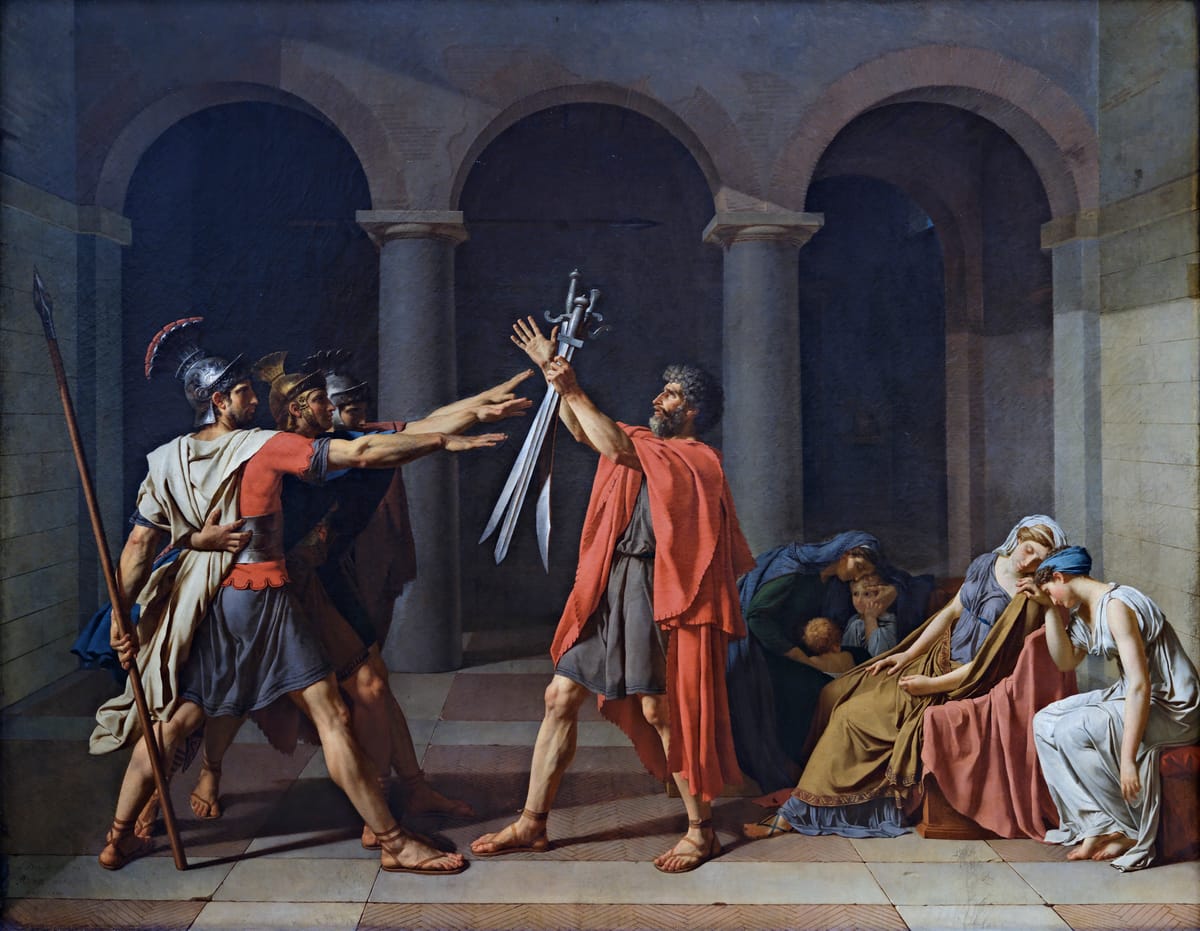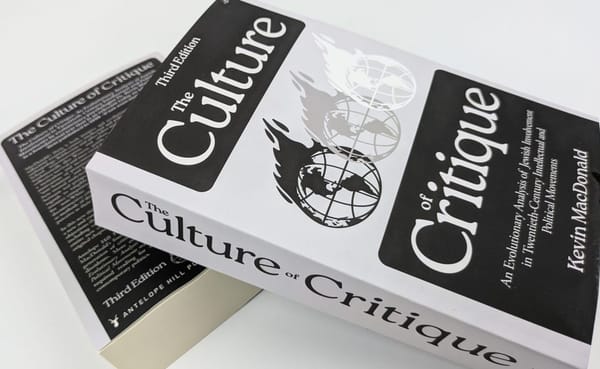An Open Letter to Christian Nationalism from a Former White Nationalist, Part 1 of 5: Politics is War
As I will elaborate on shortly, WN as a movement is over, having failed to achieve its goals. This essay, then, is my attempt to pass the torch.

Address: Politics is War
This letter is addressed to the cultural-political movement of Christian Nationalism or the New Christian Right (CN/NCR, I will consider both terms to be interchangeable). It is directed intentionally, but not solely, to CN’s public figures—pastors, speakers, authors, podcasters, etc.—as well as to all Christian Nationalists, and ultimately, to all Christians and Nationalists. I myself am a lifelong Protestant Christian, and a veteran of dissident politics for around a decade as of the writing of this essay. As suggested by the title, I have long identified and been active as a White Nationalist (WN), in multiple groups and organizations.
As I will elaborate on shortly, WN as a movement is over, having failed to achieve its goals. This essay, then, is my attempt to pass the torch, by offering a synopsis of lessons learned from my personal experience and study. My appeal to you is this: that firstly, politics is war by other means; and secondly, that the war we are in is a game of memory. He who forgets, loses. He who loses, dies—as does his posterity, his civilization, and all that he holds dear. Only he who remembers has a fighting chance.
Everything reactionary or radical today has been born of the burning civilizational pyre heaped up by the great traitor of our age: conservatism. In this, we all share a desire to apply the recognized reality that things are only worth fighting for if they are also worth winning for: things such as our faith, our liberty, the dignity of life, godly hierarchy, freedom from satanic degeneracy, our national sovereignty, and our ethnic perseverance. I appeal to you to recognize, therefore, that you are in a war, and on a long enough timeline, every war is a fight to the death.
What will follow in the parts to come are six issues to which I would exhort attention and application of the lessons learned from my own participation in the last decade of radical politics, as well as from observation of political reality in the West, and analysis of our history, both since the end of the Second World War and much farther back. Perhaps you will not agree with everything. Perhaps you will not want to publicly identify with all of it. However, I pray that you will consider it, and if you see wisdom, let it guide you on a course which we are, in truth, only just beginning, and which, if God is merciful, perhaps our grandchildren or great-grandchildren will conclude on our behalf.
The Failures and Successes of White Nationalism
When I say WN is over, I mean something specific. I do not mean the ideology of White identitarianism, which is to say the recognition of our in-group preference as rightly ordered, healthy, and necessary for preserving the valid collective entity of our ethnos; or the cause of White homelands sovereign from foreign control and invasion. These remain as valid as ever. However, it is true and practical to recognize that WN refers to a specific movement that began with the so-called Alt-Right (AR, henceforth used interchangeably with WN) sometime in the early 2010s, and was composed of a specific cluster of personalities, groups, and organizations, which as a whole have categorically failed both to coalesce into anything resembling unity, and to achieve political results on their own terms. Instead, the WN scene has languished, splintered, and produced such a weight of scandal and failure that no reasonable person can be blamed for desiring to steer clear. Therefore, I consider myself a “former” WN insofar as this observation holds true, while remaining committed to the same ideology and cause described above.
One might be surprised to learn that a movement known as “White Nationalism” and characterized by the presence of radical philosophies like National Socialism and Fascism would nonetheless be packed to the gunwales with Jews, homosexuals, neoconservatives, and Zionists, but such unmistakably is the case, and this despite the aforementioned decade since the rise of the AR in which it could have developed a coherent ideology and identity. At this point, it is obvious that all attempts at filtering and quality control have failed.
I have stated that WN did not achieve political results on its own terms. This means: Richard Spencer never got his AR think-tank in the Cato building; each micro political party never successfully ran a candidate; and rather than planting their feet in the doors of institutional power and popular influence, WNs were successfully “gatekept” from them through a combination of brutal economic, media, and legal censorship and persecution, strategic co-opting of their talking points, and false shepherding from the likes of Bronze Age Pervert and Curtis Yarvin (two examples of the aforementioned Jews, neoconservatives, and Zionists).
One might object that not all of the above is a fair criticism—for example, WNs also pioneered economic resilience and anti-fragility in response to the anarcho-tyrannical persecution they were subjected to. However, it’s still true that they failed, and if the impact of direct regime opposition contributed to this, then that is something that cannot be simply removed from the equation. If we want to succeed, there are still lessons to be learned. This leads directly into the primary success of WN: that of its ideology and rhetoric.
I claim that all post-liberal, Post-War-Consensus-critical, and to any degree pro-White positions represented in American politics today are downstream of WN. While this will doubtlessly be controversial, I beg the reader to allow me to defend it in two ways.
The first is that one very likely underestimates the degree to which now commonplace talking points, arguments, memes, and rhetoric on related subjects originated with the AR—its obscure forums, blogs, YouTube channels, debates with centrists and others, podcasts, and comment section jihads. This movement clawed its way up from the very bottom, cultivating a slowly burgeoning awareness of the depth of progressive anti-White intentions, and forming in response a positive racial consciousness. “Noticing,” “it’s ok to be X,” “humiliation ritual,” “every single time,” nation vs “economic zone,” “we can’t live like this,” “globalism,” “globohomo/globogay,” “clown/trash world,” “soy,” “X and its consequences,” “NPCs”—all these and more originated in, or were re-popularized by, the AR. The AR resurrected Kaczynski’s pivotal analysis of industrial society, and applied it to the modern context of neoliberal, anti-White, techno-hyper-capitalism. The AR singlehandedly destroyed the taboo on White explicit in-group preference as a political position. It made references to black criminality and the social costs of immigration, and mockery of “muh GDP,” ubiquitous in contemporary political dialogue. And it made it so that no Jew can ever again expect to talk about “our greatest ally,” immigrants, the benefits of sexual degeneracy and child drag shows, or why Whites shouldn’t have children, without a hundred screenshots of their last name. The Gentiles see them now, thanks to WN, and furthermore, I know that all the readers of this essay do as well, even if you don’t want to “name them” like we did for you.
Secondly, it is the very fact of a radical position existing, out there, scratching at the door and doing everything it can to get in, that opens up space for more mainstream voices to indulge in political revisionism. This is what is sometimes called pushing the “Overton Window.” Perhaps some today got their nationalism, critiques of liberalism, their questions about the Allies in World War II, or their cautious Semito-skepticism, from Pat Buchanan, Paul Gottfried, Patrick Deneen, or Darryl Cooper. But paleoconservatism, always a questionably radical position in any case, had languished in defeat for decades, itself exiled firmly to the land of political taboo as “racist” and “Nazi.” Its return was enabled not because its adherents themselves pushed the envelope, but because they got the opportunity to point at Charlottesville and say, “Yes, we’re not Jeb Bush conservatives, but we’re not them, and who would you rather have?” Lest I sound too uncharitable, I don’t mean that everyone who’d answer to a less radical label than WN or AR necessarily threw WNs under the bus publicly in such a manner. However, they all benefited from this dynamic. The very fact of the liberal system having to confront a genuinely radical set of ideologies which had forced itself into the public consciousness made everything in between less punishable by default.
The truth is that while censorship and gatekeeping can be extremely effective, there is always, even in the most oppressive of systems, a permeable membrane between the political mainstream and the fringes. The ways that rhetoric and ideas move across this membrane are myriad and sometimes indirect, but with sufficient time and persistence on the part of radicals, they inevitably come into effect as a rule of nature.
As intimated by the above, these achievements came at a cost, namely intense persecution from every possible angle. It took a long time for Shiloh Hendrix to be able to collect on her unashamed White identity (and Godspeed to her). That path is strewn with countless ruined careers, abandoned friendships, broken families, and even ended lives as a result of the relentless assault on WNs by the regime. For more people than you may realize, the “war” I mentioned earlier was not much of a hyperbole. However imperfect many of these veterans and martyrs were, we would not be where we are without their trailblazing, and a silent salute is the least any honorable man can give in response to their courage.
In the following parts, I will outline six issues I consider essential for the success of CN/NCR as both a Christian and a Nationalist movement: personal moral character; the application of “no enemies on the right”; race; Jews; Palestine; and finally, a consideration I will call “passing the test.” Together, these will cover pragmatic strategies for political success as well as the question of identity in relation to our history, current struggle, moral justifications, and definition of success.
I do not envision this struggle, in whatever form it takes, as something which I will see the end of in my own lifetime. Therefore, my intention in writing this letter as a whole has been to design not a map, but a compass. I cannot presume to tell anyone what specific steps must be taken at every possible turn. However, I believe that through analysis of our faith, our history, and our current situation, by God’s mercy we can discern the direction of true north, and act accordingly. Let the reader understand.





